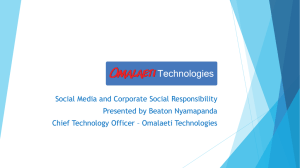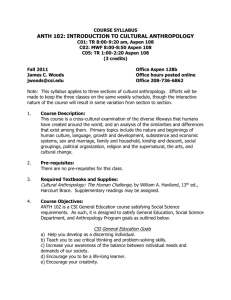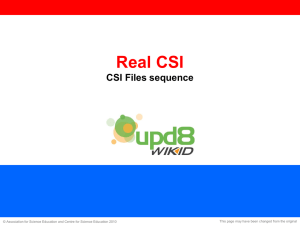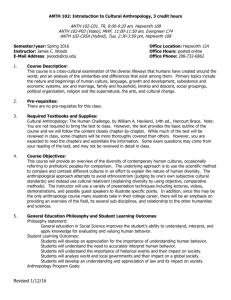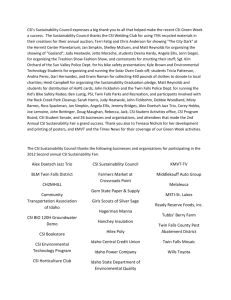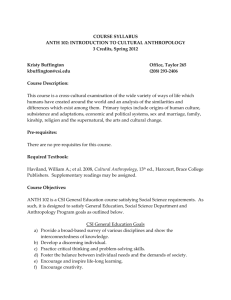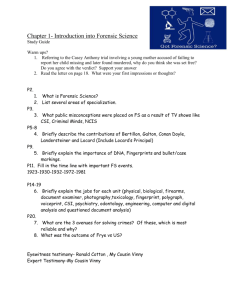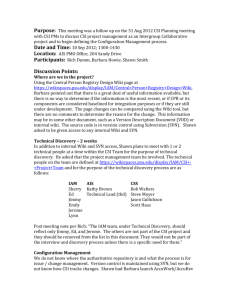ANTH 238: Native Peoples of North America
advertisement
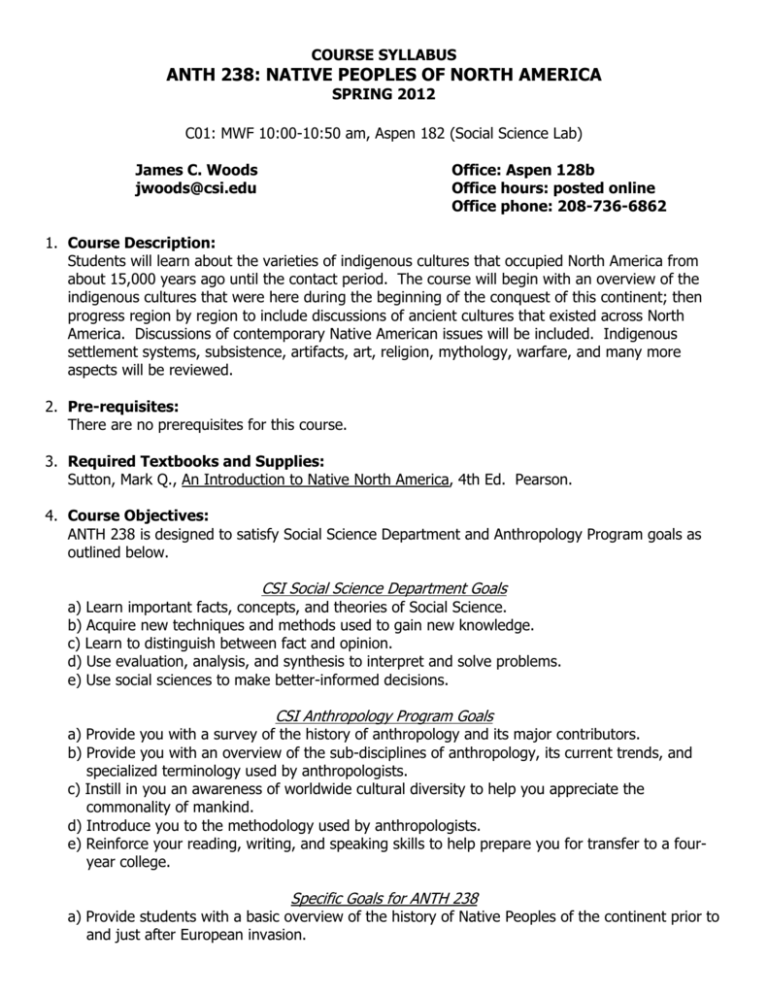
COURSE SYLLABUS ANTH 238: NATIVE PEOPLES OF NORTH AMERICA SPRING 2012 C01: MWF 10:00-10:50 am, Aspen 182 (Social Science Lab) James C. Woods jwoods@csi.edu Office: Aspen 128b Office hours: posted online Office phone: 208-736-6862 1. Course Description: Students will learn about the varieties of indigenous cultures that occupied North America from about 15,000 years ago until the contact period. The course will begin with an overview of the indigenous cultures that were here during the beginning of the conquest of this continent; then progress region by region to include discussions of ancient cultures that existed across North America. Discussions of contemporary Native American issues will be included. Indigenous settlement systems, subsistence, artifacts, art, religion, mythology, warfare, and many more aspects will be reviewed. 2. Pre-requisites: There are no prerequisites for this course. 3. Required Textbooks and Supplies: Sutton, Mark Q., An Introduction to Native North America, 4th Ed. Pearson. 4. Course Objectives: ANTH 238 is designed to satisfy Social Science Department and Anthropology Program goals as outlined below. CSI Social Science Department Goals a) Learn important facts, concepts, and theories of Social Science. b) Acquire new techniques and methods used to gain new knowledge. c) Learn to distinguish between fact and opinion. d) Use evaluation, analysis, and synthesis to interpret and solve problems. e) Use social sciences to make better-informed decisions. CSI Anthropology Program Goals a) Provide you with a survey of the history of anthropology and its major contributors. b) Provide you with an overview of the sub-disciplines of anthropology, its current trends, and specialized terminology used by anthropologists. c) Instill in you an awareness of worldwide cultural diversity to help you appreciate the commonality of mankind. d) Introduce you to the methodology used by anthropologists. e) Reinforce your reading, writing, and speaking skills to help prepare you for transfer to a fouryear college. Specific Goals for ANTH 238 a) Provide students with a basic overview of the history of Native Peoples of the continent prior to and just after European invasion. b) Provide students with specific knowledge about native people who lived in each of ten cultural sub-regions of the continent. c) Introduce students to the specialized terminology used by anthropologists to describe political, religious, economic, and subsistence systems. d) Provide hands-on experiences in replication of certain technologies used by indigenous people of the continent. e) Enhance your speaking skills by having you present a short summary of some unique aspect of one Native American group. f) (for anthropology majors especially) Help prepare you to transfer to an upper division program elsewhere. 5. Outcomes Assessment: To accommodate different learning styles, a variety of assessment methods will be used in this class to determine if you are achieving the above course objectives. In-class short essay quizzes consisting of one or two questions each will be used to measure your understanding of course content including the textbook and supplementary videos. Completion of several in-class lab projects will demonstrate your ability to solve technical problems similar to those faced by ancient craftspersons. Your ability to summarize the results of these lab projects will be measured by writing short lab critiques. In-class discussions will be used to enhance and assess your ability to verbally communicate important concepts to others. Sometime during the semester, you will be required to present an oral presentation to the class about some unique aspect of one selected Native American group. This exercise will reinforce your writing skills. Lastly, a written final exam will be used to determine your ability to synthesize course material. 6. Policies and Procedures: a. Attendance policy: Attendance is required for this course. In accordance with CSI policies, school-sanctioned absences will not count against you if advance notice is provided. Please note the following new changes to the CSI attendance policy: 1-If you fail to show up the first week of school, you will be dropped by the instructor. You may qualify for a refund and you will not receive a “W” on your transcript. 2-You can still withdraw the second week of school, but you will get a “W” on your transcript. You will not be eligible for a refund, and you cannot be reinstated. Faculty can drop students this week for “no show”. 3-During the third week, you can withdraw from class but will receive a “W” on your transcript. After the second week, faculty cannot drop students, only issue letter grades. b. Class structure: Approximately one chapter will be reviewed each week. The instructor will provide a review of chapter readings and facilitate discussions using projected lecture notes and other visual aids. Videos, slide programs, lab exercises, and demonstrations will also be used when appropriate. An active interchange between all students and the instructor will be encouraged. c. Assignments: First and foremost, you are required to read the textbook. Some questions on quizzes may come from the text without review in the classroom, and the text provides the basic organizational structure for the entire semester. It only takes an hour or so to read each chapter, PLEASE be responsible about this most important course requirement. Many assignments will be completed during class time, so these cannot be made up if you miss that class. You will also be required to make one presentation for this class as described in section 7 below. d. Plagiarism: Plagiarism and other forms of cheating are violations of the honesty policy found in the CSI General Catalog. Violators will receive a zero for the work in question. e. Cell phones: Please silence cell phone ringers, save conversations or texting for after class. f. Personal musical devices: Please do not use musical devices during class time. g. Laptops, notebooks, etc: You may use computers for taking notes, but not for accessing any social media, or other non-class-related activities. The lab has ample power sources and a fast wireless connection. h. Visitors: Lecture topics will not be adjusted for guests, some topics in this class may be unsuitable for children. Videos include some adult themes and images and are NOT rated using any standard film rating system. i. Lab: Aspen 182 contains some dangerous tools that could be reached by small children. As a result, young visitors are not allowed in the lab. 7. Presentation: “Now, that is something different” You will be required to make a short presentation (5-10 min max) which describes some aspect of a Native American culture that is unique or not well known. A list of groups you can select from is at the end of this syllabus. This can be presented any time during the semester, but no later than April 20, 2012. For example, if you selected “Navajo” from the list, it would likely be already wellknown that they were a pastoralists whose main economy was the raising of sheep that they originally got from the Spanish. That information would not be unique. What might be, however, is that they made large medicinal “paintings” on the ground out of colored sand, then placed sick people inside the painting to heal them. Following the healing, they would collect the colored sand and toss it to the four cardinal directions. 8. Grading Practices: a. Testing procedure: Six essay responses to videos, 25 points each, 150 points total Two “homework” writing exercises, 50 points each, 100 points total Five lab critiques, 50 points each, 250 points total “Now, that is something different!” class presentation, 100 points Final Exam, 200 points TOTAL MAXIMUM POINTS, 800 (no extra credit) b. Grading Scale: you can earn a maximum of 800 points and your final grade will be determined by the percentage of this total -- A=90-100%, B=80-89%, C=70-79%, D=60-69%, F=under 60%. Special note: It is the student’s responsibility to drop the course. A student may drop a course or all courses prior to the end of late registration (first Friday of term) w/o it being recorded on the student’s official transcript. A student initiated drop after the late registration period is considered a withdrawal, and results in the grade of W. (Students may drop courses online until the end of the late registration period. In order to withdraw from one or more courses following late registration, a completed registration form is required. Instructions on the form indicate when a signature of instructor and/or Financial Aid advisor is required. The completed form may be submitted to Admissions & Records or any offcampus center.) Students may withdraw from courses until 75% of the course meetings have elapsed. No course may be withdrawn from after 75% of the course has elapsed. 9. CSI E-mail Since email is the primary source of written communication with students, all registered CSI students get a college email account. Student e-mail addresses have the following format: <address>@eaglemail.csi.edu where <address> is a name selected by the student as a part of activating his/her account. Students activate their accounts and check their CSI e-mail online at http://eaglemail.csi.edu. Instructors and various offices send messages to these student accounts. Students must check their CSI e-mail accounts regularly to avoid missing important messages and deadlines. At the beginning of each semester free training sessions are offered to students who need help in using their accounts. 10. On-line course evaluation: To help instructors continually improve courses, students are strongly encouraged to go online to http://evaluation.csi.edu and complete anonymous evaluations which open two weeks before the end of the course and close the last day of class. When students enter the site, they find evaluations for their enrolled courses. Thank you for this valuable input! 11. Disabilities: Any student with a documented disability may be eligible for reasonable accommodations. To determine eligibility and secure services, students should contact Student Disability Services at their first opportunity after registration for a class(es). Student Disability Services is located on the second floor of the Taylor Building on the Twin Falls Campus. 208.732.6260 or e-mail Scott Scholes, sscholes@csi.edu. 12. Mission Statements: a) CSI Mission Statement: The College of Southern Idaho, a comprehensive community college, provides educational, social and cultural opportunities for the diverse population of South Central Idaho. In this rapidly changing world, CSI encourages our students to lead enriched, productive and responsible lives. b) CSI Social Science Department Mission Statement : The mission of the Social Science Department is to provide educational, social, and cultural opportunities which encourage enriched, productive and responsible lives primarily by instructing students to understand, interpret, and apply Social Science discipline coursework. c) CSI Anthropology Program Mission Statement : The Anthropology Program will provide students with a basic introduction to the sub-disciplines of anthropology, familiarize students with major theories and contributors, and prepare students for transfer elsewhere to upper division studies. 13. Topical Outline for the Course: The following schedule is provided as a general guide only. Some adjustments will be made to accommodate special class interests, weather cancellations, etc. It will be your responsibility to keep current with the readings. Please be aware that you are expected to read the assigned pages BEFORE the class meets so you can participate in discussions. Week* Ch Lecture/Discussion Topics (follows text) Jan 16 Martin Luther King Day (campus closed) Jan 17-20 Jan 23-27 1 2 Jan 30-Feb 3 3 Introduction European Invasion and Conquest Video “Ishi in Two Worlds” Native Peoples of the Arctic Carve soapstone fetish Feb 6-10 4 Feb 13-17 5 Feb 20 Feb 21-24 Feb 27-Mar 2 March 5-9 March 12-16 Mar 19-23 Mar 26-30 Apr 2-6 Apr 9-13 Apr 16-20 Apr 23-27 Apr 30-May 4 Native Peoples of the Subarctic Video “Inuit Odyssey” Native Peoples of the Plateau Paint petroglyph Presidents’ Day (campus closed) 6 Native Peoples of the Northwest Coast Video “Crooked Beak of Heaven” 7 Native Peoples of the Great Basin Knap an arrow point 8 Native Peoples of California Video “On the Obsidian Trail” 9 Native Peoples of the Southwest Make Hohokam bighorn sheep clay figurine 10 Native Peoples of the Plains Video “Plains Indians” Spring Break (campus closed) Make Plains-style medicine bag 11 Native Peoples of the Northeast Video “Mystery of the Red Paint People” 12 Native Peoples of the Southeast 13 Contemporary Issues Review for Final Exam May 7, Monday ANTH 238-C01 Final Exam, 10:00 am - noon May 16 Grades available online at MyCSI *Some dates may change due to the informal nature of class discussions, guest visitors to class, uncontrollable cancellations due to weather, etc. 14. A Partial List of Native American Groups from North America Aleut Assiniboine Blackfoot Cherokee Comanche Copper Inuit Chipewyan Creek Delaware Havasupai Hopi Innu Iroquois Klamath Lower Chinookans Mescalero Apache Mi'kmaq Navajo Nuu-chah-nulth Nuxalk O'odham Ojibwa Omaha Osage Pawnee Pomo Quinault Seminole Stoney Tewa Pueblos Tlingit Ute Western Apache Western Woods Cree Winnebago/Ho-Chunk Yokuts Yuki Yurok Zia Pueblo
